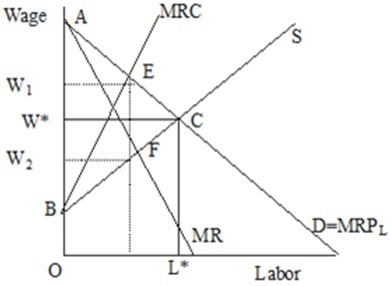The Great Depression did not
A. Lead to a high rate of inflation.
B. Lead to an unemployment rate that reached 25 percent.
C. Cause President Roosevelt to declare a "bank holiday" in 1933.
D. Follow a period of apparent prosperity.
Answer: A
You might also like to view...
Contrast the Keynesian and Monetarist views on how a change in the money supply impacts the economy
Firms often seek to borrow money to expand their capital stock, and the price they pay for the money is the interest rate. What happens to the quantity of money supplied if the interest rate increases?
a. It increases. b. It decreases. c. It does not change. d. It depends entirely on the interest rate.
In Figure 45.5, where one union is bargaining against one employer, the wage paid to workers will be  Figure 45.5
Figure 45.5
A. W2. B. W1. C. W*. D. an undetermined point between W1 and W2.
A tax that is imposed on an imported good is called a
A) tariff. B) quota. C) government license. D) patent.